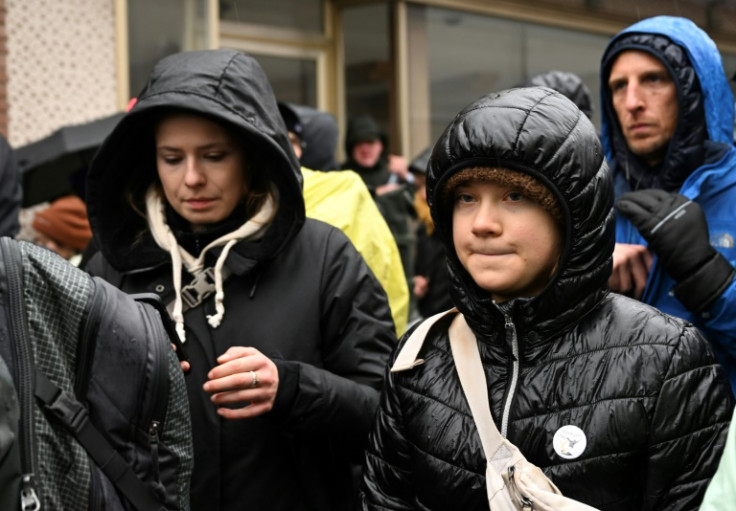Continued use of fossil fuels will be death sentence for millions globally: Greta Thunberg
Climate change is already causing record-setting temperatures to become more frequent.

In yet another stark warning, climate activist Greta Thunberg has said that the failure to phase out fossil fuels will prove to be a "death sentence" to millions of poor people.
Thunberg made the comments during a press conference held in Bonn, Germany, where governments have gathered to hold UN-led discussions on the climate crisis.
"It will be impossible for us to stick to the 1.5-degree limit without a rapid, equitable, fossil fuel phase-out," Thunberg told a press conference. "If we do not [phase out fossil fuels], it will be a death sentence for countless people. It is already a death sentence for countless people," she said.
Thunberg is just one of the thousands of people who have been fighting for people's rights to a clean environment and a habitable earth.
Swedish climate activist Greta Thunberg joined a protest in Germany during the Bonn Climate Change Conference pic.twitter.com/eAID5HDYNa
— Reuters (@Reuters) June 13, 2023
In 2018, she sat outside the Swedish parliament for days to make people aware of the threat posed by climate change. She was soon joined by thousands of students across Sweden who skipped school to protest against climate change, per The Guardian.
She was even nominated for a Nobel Peace Prize. She has delivered rousing speeches at the EU parliament, the UN, and the UK parliament, calling on world leaders to take swift action against climate change.
Do we really need to worry?
It said that Earth's average temperature will hit the 1.5ºC threshold around 2030, a decade earlier than projected only three years ago. The UN has urged the world to urgently take steps to stop global warming.
Climate change is causing record-setting temperatures to become more frequent. The UN's Intergovernmental Panel on Climate Change indicates that crossing the 1.5C threshold risks unleashing far more severe climate change impacts, including more frequent and severe droughts, heatwaves, and rainfall.
The planet is already 1.2°C warmer than in pre-industrial times. In order to limit global warming to 1.5ºC, greenhouse gas emissions must peak before 2025 at the latest and decline by 43 percent by 2030.
Marine heatwaves, mass fish die-offs, wildfires, droughts, and floods have become all too common over the past few years. No country or region has remained immune from rising global temperatures.
Scientists and climate activists have been urging governments to reduce their reliance on fossil fuels such as coal, oil and gas. These are the major sources of climate-warming greenhouse gas emissions.
According to a report by the UN's World Meteorological Organisation (WMO), two million people have been killed by extreme weather, climate, and water-related events since 1970.
"The most vulnerable communities, unfortunately, bear the brunt of weather, climate, and water-related hazards," said Prof. Petteri Taalas, the WMO's Secretary General.
Recently, Professors Johan Rockstrom of the Potsdam Institute for Climate Impact Research and David King, chair of the Centre for Climate Repair at the University of Cambridge, have said that failure to limit the temperature rise could lead to the collapse of life on the planet.
The impact on the UK:
A study recently revealed that there will be a 25 percent increase in the annual amount of damage from floods in some parts of the UK.
The study also shows that if Net Zero promises are not met collectively, the annual cost of flooding in the country could grow between 13 percent and 23 percent in the next century, depending on different levels of extreme climate projections.
Extreme temperatures have been a leading cause of reported deaths in Europe. Last year, record-breaking heat turned Britain into a microwave oven.
🔥 The East Coast Mainline has re-opened following a fire that spread to the track in Sandy, Bedfordshire - due to the extreme heat. 🌡️
— Network Rail (@networkrail) July 20, 2022
⚠️ Disruption is still to be expected throughout the day, so check before you travel - @nationalrailenq.
➡️ https://t.co/4wBwJJ7g6T pic.twitter.com/qQ1fj0f0NG
Social media platforms were flooded with pictures of molten roads and train signals. Luton Airport even had to suspend flights after the excessive heat damaged part of the runway.
The country now needs to design its infrastructure in such a manner that it is able to cope with the rising temperatures. Houses need better ventilation and shading, town planners need to leave more space for trees, and rails and roads need to be able to handle higher temperatures if the country wishes to avoid the meltdown it is experiencing now.
The UK's infrastructure is not designed to handle extreme heat. The roads and rail networks are not equipped to handle the heat experienced by countries with hotter climates. The heatwave also caused wildfires in several parts of the UK, including London, Kent, Cornwall, and Pembrokeshire.
© Copyright IBTimes 2025. All rights reserved.





















